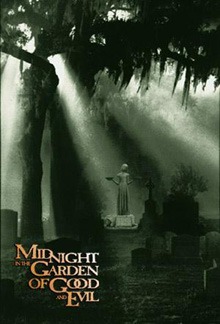Let the world take note: Steven Spielberg has returned to the arena of “important filmmaking”. However, considering his last “important” film was the masterful Schindler’s List, he’s got a lot to live up to. And although he tackles an appropriately weighty subject, slavery, what he has created is a good, but not great, drama.
In 1839, and filmed as a striking prologue for the film, a group of African captives break loose and mutiny on the slave ship La Amistad. Led by Cinque (Djimon Hounsou), the rebellion succeeds, but it is only a matter of time before the drifting ship is captured off the Atlantic coast, and the Africans are clapped back in chains.
The United States at this point is at a difficult point in its history. The president, Martin Van Buren (Nigel Hawthorne), is hoping for reelection in a divided country. When the Amistad Africans are sent to court (mostly to determine who are their rightful owners, and therefore who gets to administer the punishment for their mutiny), Van Buren doesn’t care too deeply about the outcome…as long as the trial doesn’t raise some prickly issues about slavery that could cost him the Southern vote.
As for the Africans, two abolitionists (Morgan Freeman and Stellan Skarsgård) enlist the aid of a property attorney, Roger Baldwin (Matthew McConaughey), for the defense. They seek to prove that the Africans didn’t originate from a slave plantation in Havana (as the Spanish claim) thereby making them legal slaves, but instead they were illegally kidnapped from their homes in Africa and sold into slavery. In effort to help their cause, the abolitionists attempt to gain the support of ex-President John Quincy Adams (Anthony Hopkins), who, as a retired old man, is reluctant to hop back into the fray.
More fascinating as a history lesson than as a gripping drama, Amistad’s biggest misstep is failing to provide an intriguing main character. The film tries with Cinque, but fails. His role, with the exception of the opening mutiny, is primarily one of reaction, not action. And the man remains a cipher for most of the film, speaking only in Mende, which is translated only part of the time. McConaughey’s lawyer is never developed enough to be interesting, and the film’s two abolitionists are uninspiring (and the subplot wherein they turn on one another is as confusing as it is pointless).
Only Anthony Hopkins’ dynamic portrayal of a man overshadowed and past his prime, doing something worthwhile for a change, has that spark of zest which should have enlivened the whole film. Unfortunately, his role is clearly a supporting one, and by no means can carry the whole picture.
However, on an academic level, the film is fascinating. The production crew went out of their way to recreate the atmosphere of 1839. You could almost lose yourself in the historical richness of the sets and costumes.
Spielberg’s direction is a mixed bag. The opening and closing of the film are wonderfully done, but the middle seems to drag. Only a 10-minute flashback to the Africans’ capture and their journeys on the slave ship seems beyond the ordinary. Several of the film’ “inspiring” moments seem forced (such as Cinque’s freedom chant, or one of the African’s interpretation of Christianity).
Although not the grandiose epic it strives to be, Amistad is still a good film, with solid, but not superb, acting, and competent, but not transcendent, direction.







